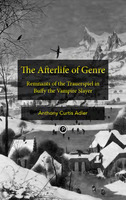The Afterlife of Genre: Remnants of the Trauerspiel in Buffy the Vampire Slayer
| dc.contributor.author | Adler, Anthony Curtis | |
| dc.date.accessioned | 2019-03-26 23:55 | |
| dc.date.accessioned | 2020-01-23 14:09:07 | |
| dc.date.accessioned | 2020-04-01T10:43:18Z | |
| dc.date.available | 2020-04-01T10:43:18Z | |
| dc.date.issued | 2014 | |
| dc.identifier | 1004538 | |
| dc.identifier | OCN: 945782704 | en_US |
| dc.identifier.uri | http://library.oapen.org/handle/20.500.12657/25557 | |
| dc.description.abstract | Could there have been television without California? California without television? The one shows the other: the ostentatiously novel singularity of the place and the seemingly self-effacing transparency of the medium. Yet if television and California both promise again and again to offer us something new, young, immaculate in its transience — a pure surface that will never get caught in the ditch of time — they are also both haunted through and through: by the itinerant contents of the past that they cannot banish, by memories of the infantile-perverse utopian fantasies that taunt us in constant replay (“If you’re going to San Francisco…,” “two girls for every guy”), by the contradiction played out in the very gesture of dismissing history and leaving the dead to bury the dead. California and television, as it were, conspire in a vampirologic: the forever-young is what has been there the longest, what really “takes us back.” | |
| dc.language | English | |
| dc.subject.classification | thema EDItEUR::J Society and Social Sciences::JB Society and culture: general::JBC Cultural and media studies::JBCT Media studies | en_US |
| dc.subject.other | California | |
| dc.subject.other | television | |
| dc.subject.other | media studies | |
| dc.title | The Afterlife of Genre: Remnants of the Trauerspiel in Buffy the Vampire Slayer | |
| dc.type | book | |
| oapen.identifier.doi | 10.21983/P3.0061.1.00 | |
| oapen.relation.isPublishedBy | 979dc044-00ee-4ea2-affc-b08c5bd42d13 | |
| oapen.relation.isbn | 9780615955742 | |
| oapen.collection | ScholarLed | |
| oapen.pages | 76 | |
| oapen.place.publication | Brooklyn, NY | |
| oapen.identifier.ocn | 945782704 |

